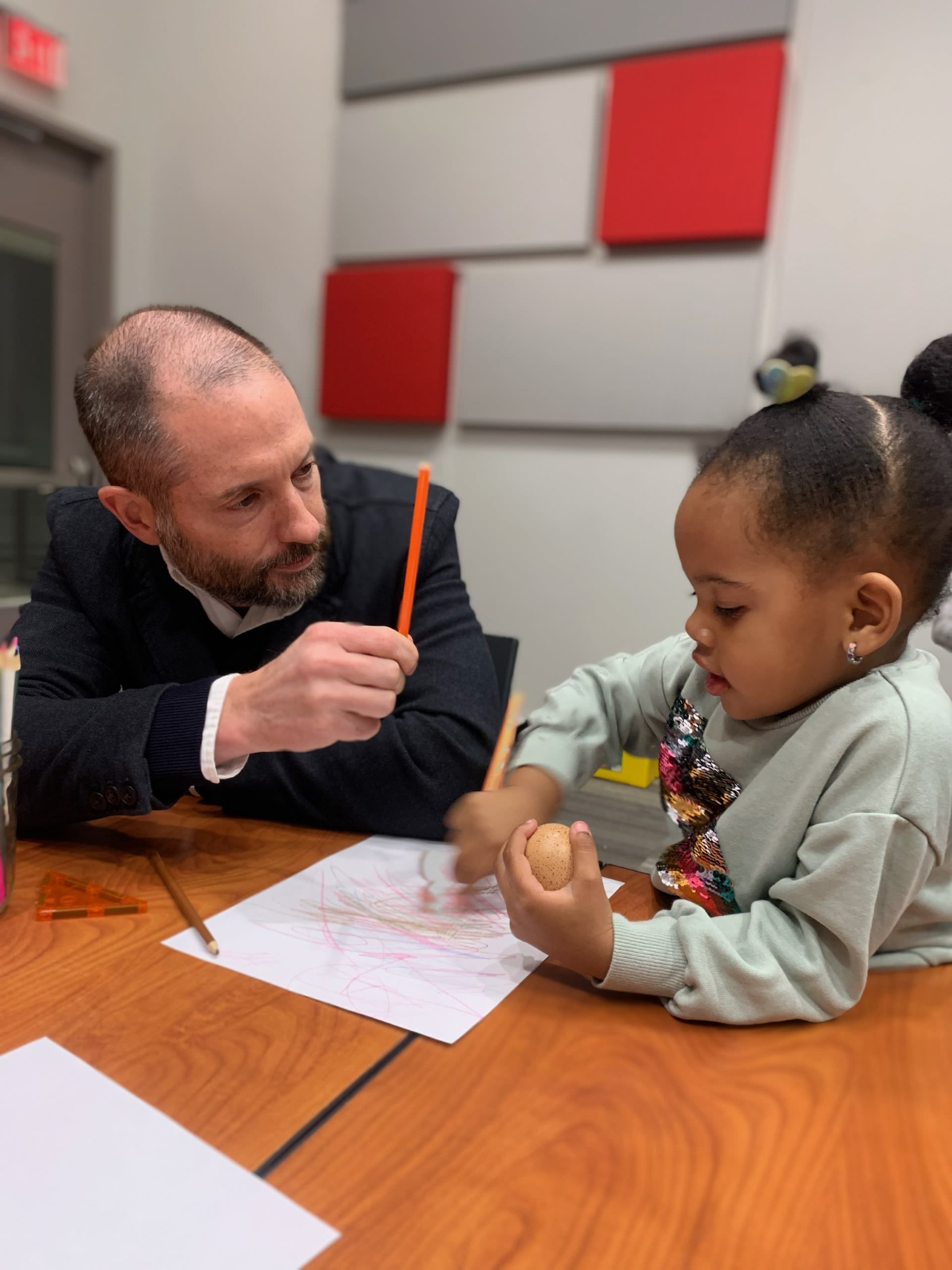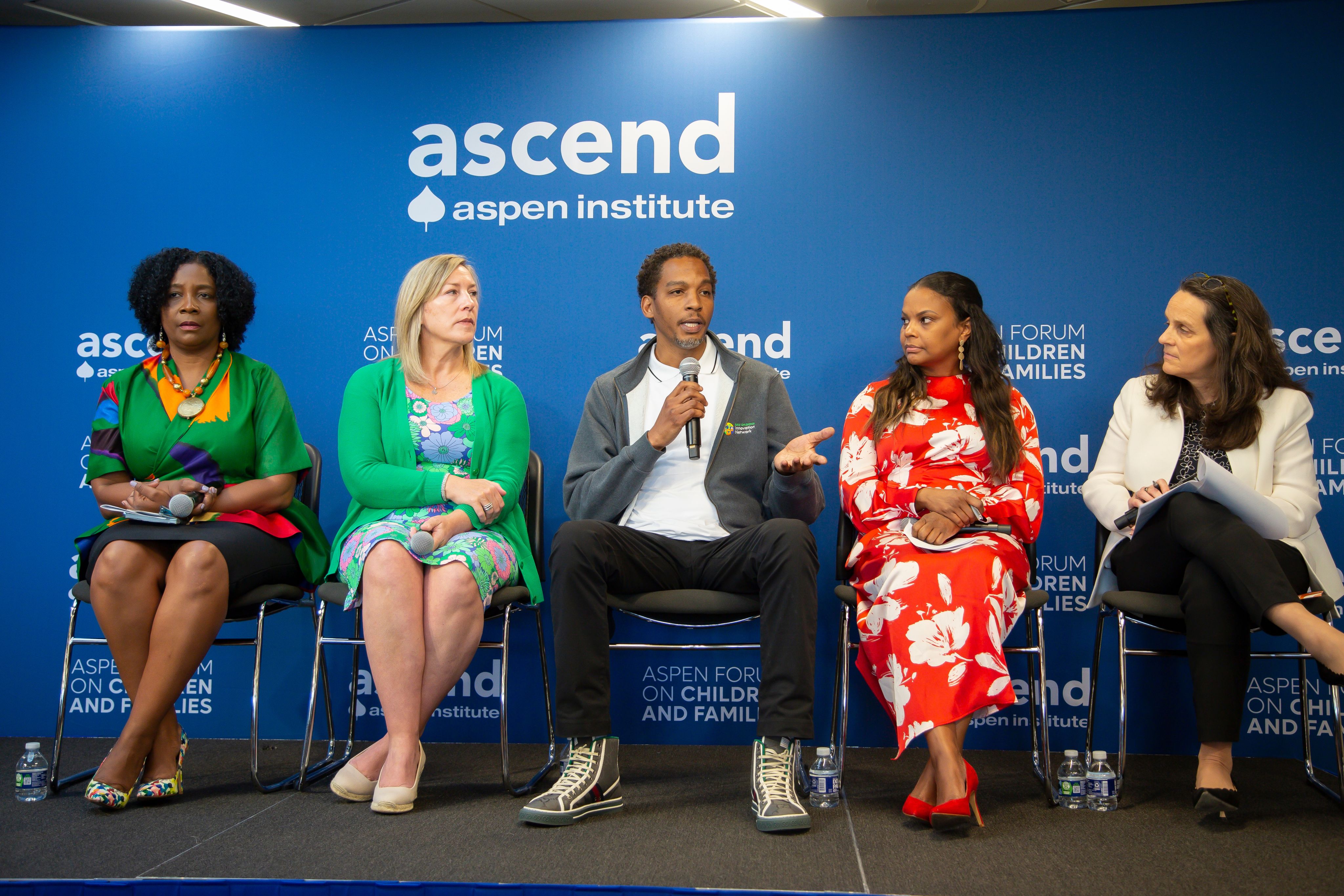Problem Solvers
Ascend Fellow Dr. Matthew Biel is equipping a new workforce to support the mental health of families

“You'd be confused if you walked into most places where children receive mental health treatment,” child psychiatrist Dr. Matthew Biel shared earlier this year during an Ascend panel discussing mental health and well-being in youth. “Because their family members are treated like appendages rather than as an inherent way to understand what's going on in a child's life, or a way to understand what the path toward healing might be. So, that's a big problem.”
Fortunately for families throughout the Washington, DC, area, Matt — a 2018 Ascend Fellow and the director of child psychiatry at Georgetown University — is on a mission to fix that problem, one community at a time.
In 2016, Matt co-founded the Early Childhood Innovation Network (ECIN). Since then, this consortium of health care and education providers, community-based organizations, and researchers has been co-creating solutions and, in 2020, launched a trailblazing new program to train community health workers in the DC area to serve as a first line of defense for children and families.
“It’s often the case that the single best thing you can do for a child who’s struggling is to help the parent first,” Matt says. “We need to think about kids in terms of their families, their neighborhood, their community, and their culture.”
The need for this kind of bold thinking focused on crisis prevention has never been more urgent, as the United States faces a worsening mental health crisis across generations — along with a shortage of trained professionals to address it. Nearly 20 percent of children between ages 2 and 8 had a diagnosed mental, behavioral, or developmental disorder in the last year. Adults have higher rates of diagnosis, yet only 47.2% of adults diagnosed with mental illness receive treatment. But one encouraging number was found in recent polling conducted by LRP on behalf of Ascend: 64% of respondents agreed that emotional and mental health screenings and services would benefit the whole family if parents and children could access these screenings and services together.
Matt and his team focus on mental health awareness for the families of children in their earliest years. “We shouldn’t wait for mental illness to strike in order to activate a response,” Matt says. “To address the stresses that families are experiencing, we need to be in all of the places where children and their families spend time. We need to be where they’re living, learning, playing, and working.”
ECIN’s reach has grown gradually, one school at a time. After partnering with a new site, ECIN staff identifies one parent from the school to join their team and help build awareness of mental health and treatment among families in the school’s community. Today, ECIN operates in a dozen learning centers around Washington, DC.
“We found that parents who’ve made an effort to get their kids into a great Head Start center are also, often, parents who are willing to make the effort to identify their own mental health needs,” Matt explains.

Unsurprisingly, recruiting parents to be part of their work has had a positive impact. “We realized we ought to do this at a little bit more scale,” Matt says. Fast forward eight years, and ECIN is working to scale its state-approved training model, called the Family Leadership Certificate. Launched in 2020, this credentialing program, run by the Georgetown Center for Continuing Studies, allows family members and youth peer advocates to become certified mental health workers. Participants complete a 10-month training program, which concludes with a two-month apprenticeship at a child care center or health care facility.
“It leads to a virtuous cycle where caregivers and adults can acquire new skills and are given opportunities, and then begin a path to economic security and can help children and their communities thrive,” he says.
The Family Leadership Certificate program is game-changing in two crucial ways: First, it adds desperately needed new talent to the mental health workforce. Second, it connects families to culturally aligned peers who have similar lived experience and culturally responsive understandings about the community. Barriers to certification are purposefully minimal, with no education requirement and only one prerequisite — which is that participants need to be or have been a parent or a caregiver for a child in the District of Columbia.
“We’re not training community health workers, hopefully by the thousands — to become therapists,” Matt emphasizes. “We’re training them to think through a community lens about this community, this block, in this family, and in this child. [Family Leadership Certificate recipients] will bethe first point of contact for a kid who is struggling or a parent whose behavior is a challenge. We’re not rushing the kid to a diagnosis. Instead, we’re saying, ‘What’s going on in this kid’s world? What are the stresses on their family? How are their parents doing? Who are their parents connected to? What’s the social network around this child?’”

With 48 graduates from two cohorts and a third cohort slated to complete training in spring 2024, the program has a 90 percent retention rate. “When we start to create these inroads into the workforce, the ripple effects are powerfully positive,” Matt says. “Having a job and a profession inspires a sense of hopefulness and the kind of economic stabilization that feeds into the health ecology of a community and a family’s own health.” Certified graduates have been hired or been considered for openings at an array of cross-sector institutions, including early childhood learning centers, MedStar Health, Children’s National Medical Center, and DC’s Child and Family Services Agency.
The expansion of ECIN’s cross-sector approach throughout DC is a testimony to the transformative impact of 2Gen approaches. And there’s so much more work to be done. The policy team at ECIN continuously studies how to minimize barriers to creating a workforce pipeline, with hopes of influencing mental health training and job placement efforts nationwide. Once individuals become certified, Matt explains, “We need to get them into the places where kids and families spend time — primary care health clinics, schools, into Head Start, community rec centers.”
As he looks toward the future, Matt can’t help but acknowledge the partnerships that have enabled his vision so far. Since becoming an Ascend Fellow in 2018, Matt has had opportunities to connect with new funders and deepen relationships with existing partners as he establishes a sustainable funding model for ECIN.
“We’re eight years into our work with the Marriott Foundation. This has been a genuine partnership. They allowed us the luxury of time — they didn’t ask us to produce typical deliverables early in grant cycles,” Matt says. “You can achieve a lot in 12 or 18 months, and those grants are helpful. But for something like Family Leadership Certificates to happen, you need [more] time. There has to be a planning period, and time for relationship-building and genuine stakeholder and community involvement. When we started a training program [in 2020], local community members said, ‘Oh, we know these people, they’ve been in our Head Start center for years,’ and 30 people signed up.”
At Ascend, we’re inspired and proud to partner with Matt and his team through our 2Gen Accelerator Community as they publish findings from their vanguard mental health workforce training program to scale whole-family solutions across the US. ECIN’s bold vision and steadfast commitment to equity and inclusive mental health approaches show that our communities become stronger and more equipped to face challenges when we’re working together, across sectors, and across generations.
To find out more about ECIN and the Family Leadership Certificate, we encourage you to visit ecin.org.
